🛠️ Crossing the Technical Barrier to achieve more ambitious projects
A few months ago I made the bet to change professional orientation, leaving aside my aspiration for working in Financial Markets to move into the world of Data without having any prior education in the field nor technical skills.

You may wonder why I decided to make such a move ?
Since I started my Business school four years ago, I’ve been passionate about Technology, the world of startups and entrepreneurship. Often, I’ve been frustrated at not being able to test my ideas and side projects on my own because of my lack of technical skills. I wanted to be able to do things by myself, be independent technically and understand the Tech environment. Thus, I found the idea of learning how to code very exciting.
But I struggled a lot at the beginning as I didn’t know where I should start, what were the best materials and in what order I should have consumed them. So, I spent time reading a lot of articles related to Data, talking to some data professionals and finally I found my way. I built my own training plan with a clear goal: being employable in a Data position as fast as possible.
After 3 intensive months of online training, coding and building side projects, in parallel with my last year Business school internship in Finance, I managed to earn my ticket to the world of Data by getting my first experience as a Data Analyst Intern in a Tech startup based in Paris. And looking back, it was one of the best moves I’ve ever made.
Now, it’s time to move on the next step.
Here is how I structured my training plan to solidify my Beginner Tech Stack and move to an Intermediate/Advanced one in the next few months.
⚠️ Note : this article is a never ending work in progress, I’ll be posting some updates regularly in the “Updates” section at the end of the article. You can follow my advancement at any time by looking at my Public Trello Board .
📈 My plan to move to the next level
Before starting my internship, I’ve been focusing on building foundational skills in Statistics, Python (mainly : syntax, loops, data types, dictionaries, lists, Pandas, Matplotlib, Numpy) and SQL.
Now that I’ve spent a few months as a Data Analyst intern, I’ve consolidated foundations, developed a methodology to approach data problems and new skills particularly on Tableau (visualisation tool), which was totally new for me. Overall, these are the main tools for a Data Analyst and I still need to work on them to have solid experience and knowledge with this stack.
Here is the big picture of where I am currently standing.
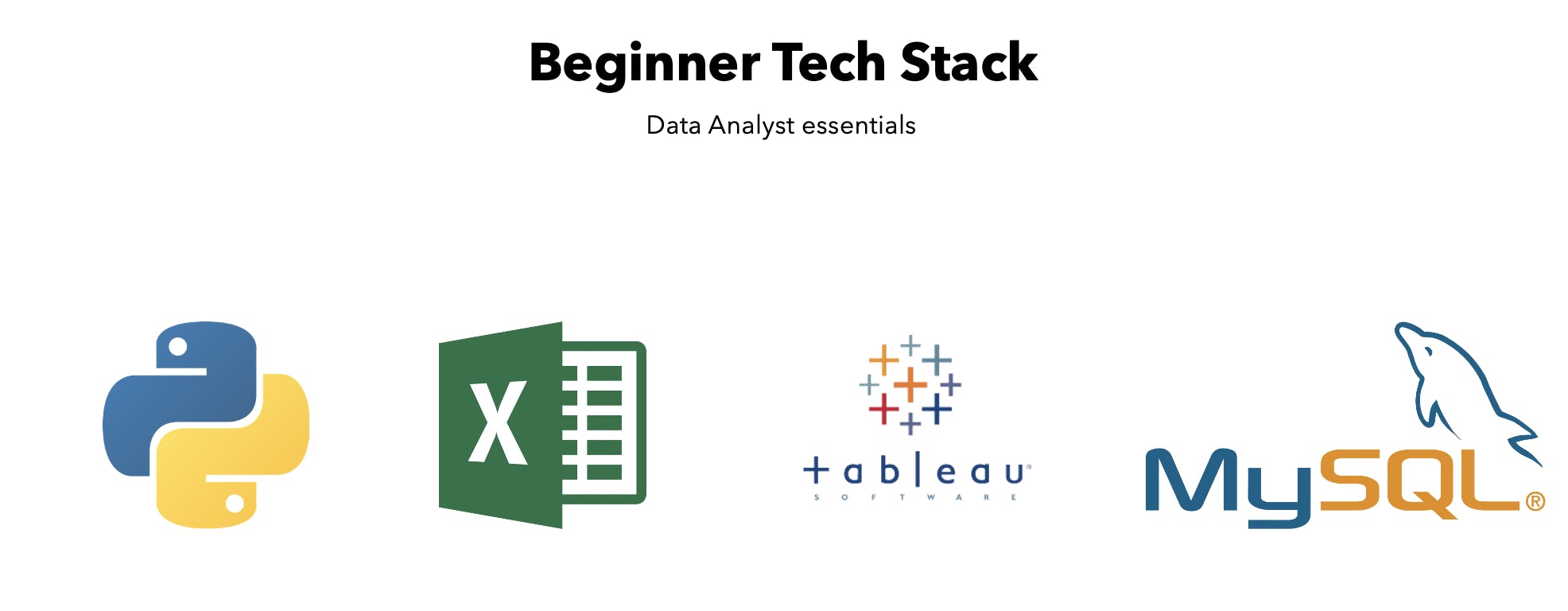
Recently, I’ve had the chance to read this article about the Data Science Hierarchy of Needs which helped me visualise how crucial and hard it is to have a reliable data flow (roughly defined for an organisation as having easily accessible data with reliable streams / ETL) as it is at the beginning of the value chain of any Data Analysis/Project. My short experience as an analyst taught me that as well. Indeed, you can be the most proficient Data Scientist, be able to build the most innovative machine learning models but if you don’t have reliable data, you will go nowhere.
“Think of AI as the top of a pyramid of needs. Yes, self-actualization (AI) is great, but you first need food, water and shelter (data literacy, collection and infrastructure).” - Monica Rogati.
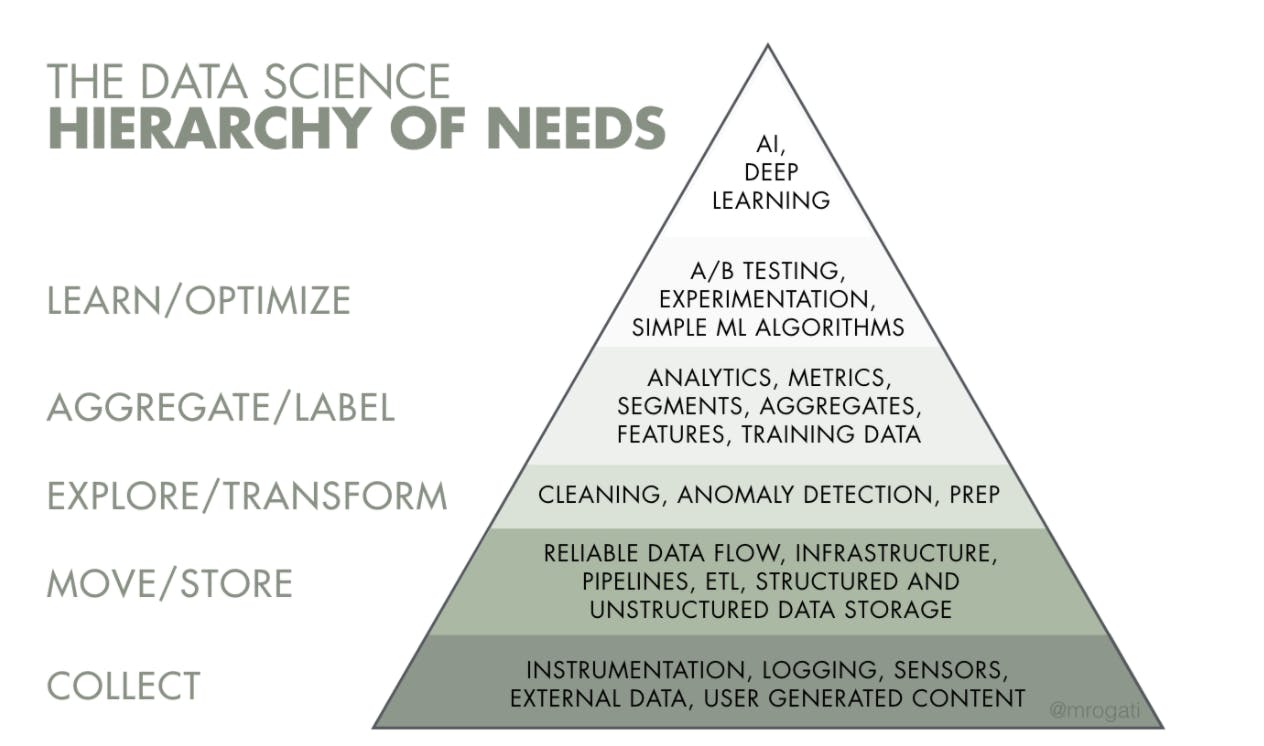
That’s the reason why I’ve decided to prioritise and focus on developing Data Engineering skills in the next few months, related to the “Move/Store” strata of the pyramid.
I don’t want to rely on how good the company I’m working for is to deliver quality data, I want to be able to contribute to make it better.
Here are 3 examples of the direction I have chosen to take in the next few months and how this is shaping the Tech Stack I’m aiming for :
- First, I want to learn more on how to manage large amounts of unstructured data. So, grasping a NoSQL tool like MongoDB will be an inevitable step
- Then, I want to learn how to write data pipelines with a scheduler in Python using Apache Spark
- Finally, I will dedicate a great amount of time to learn how to deploy a Data Warehouse for Business intelligence implementation
Overall, here is the big picture of where I want my Tech Stack to stand in 6 to 12 months.
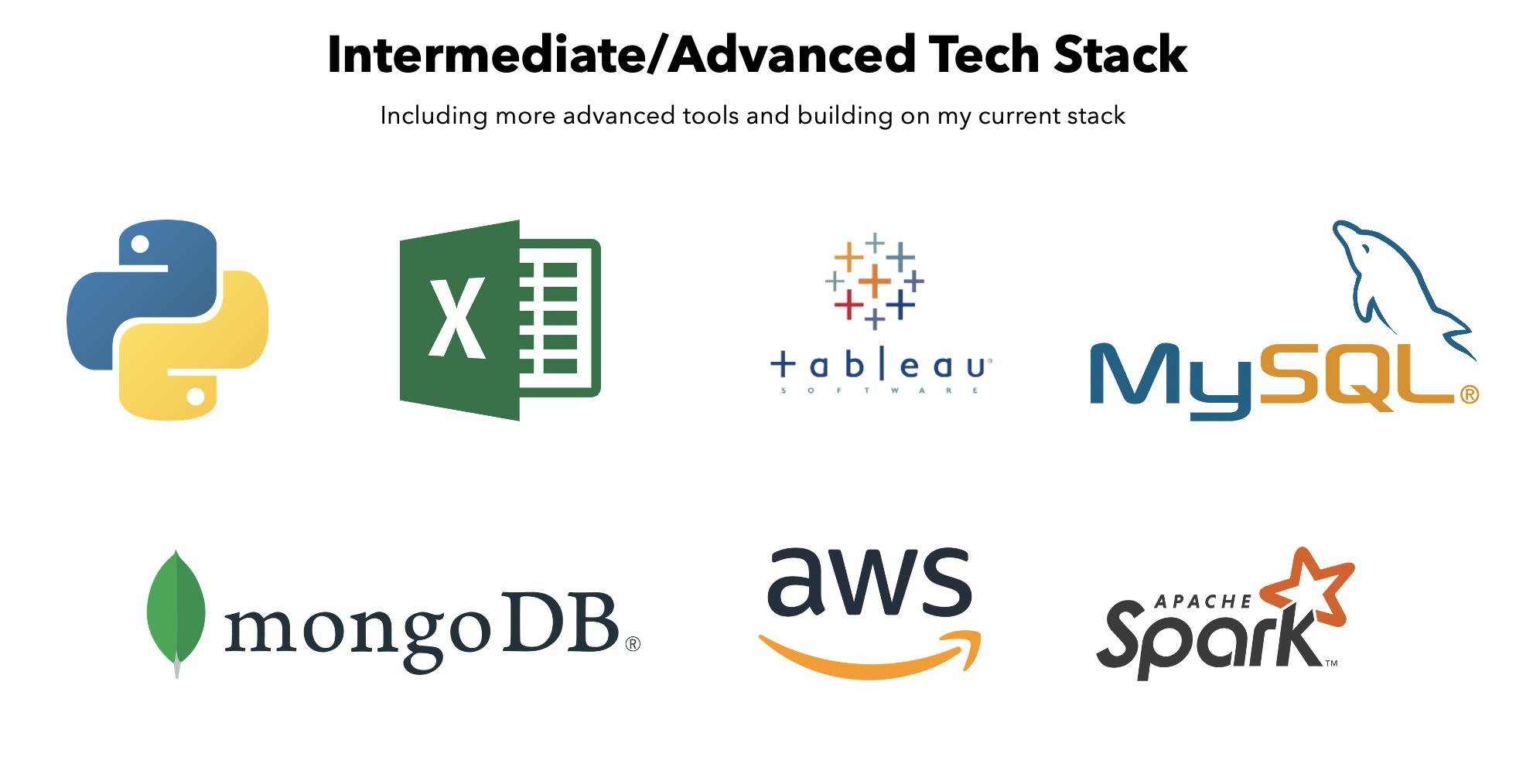
I’m 100% aware that developing these skills on my own is a great challenge and that it will take time to learn and experiment. But I’m definitely motivated to work on them as I know how valuable and foundational they are for any data driven organisation. I will build this stack step by step, by learning the elementary concepts along the way and practicing as much as possible through intermediary side projects.
In the next 3 months, I will be focused on :
- 1) Solidifying my foundational skills in probability and statistics
- 2) Getting an introduction to Data Engineering
📚 My Curriculum [evolutive content]
I want to reach the level where I am dangerous enough to use Data and Analytics as a tool to bring value to the world
When I’m learning something new, my priority is to assemble a foundation of knowledge I can use to build things. Indeed, I’m not learning these technologies for the sake of learning. I’m going to use what I learn to build valuable products and insights.
Thus, the way I choose the contents I study to learn something new is based on the following criteria :
- Reputation of the authors of the material and/or the online platform which is delivering the course
- A hands on, practical “learning by doing” approach. I don’t want to focus only on theory, I want to practice as much as possible. So, finding a material which includes guided side projects is a must
- It needs to have free content to begin (if it’s an online course). I never pay for courses if I haven’t had the chance to try free lessons beforehand.
If you are willing to learn programming in Python or Data in general, I recommend you to start with Dataquest . It gathered all my learning requirements and so far it helped me a lot in achieving my goals. This is the main platform I will use in the next 3 months to solidify my skills in Probability and Statistics as well as getting an introduction to Data Engineering.
Following a colleague's nice recommendation, I’ve also selected the book “ Python for Marketing Research and Analytics ” to improve my methodology using Python and Statistics to solve business problems.
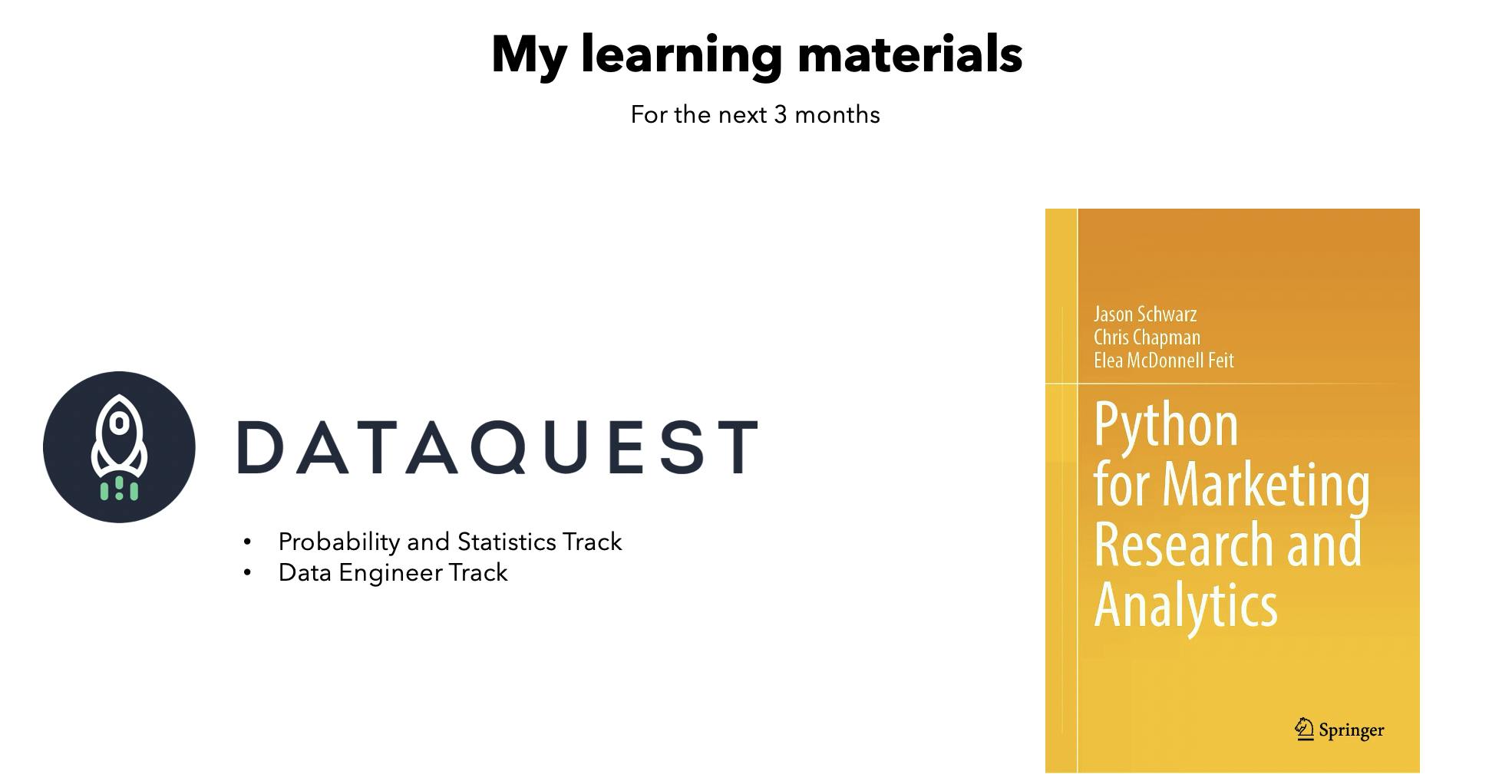
🎯 My Trello Board to stay on top of everything
I’m tracking all of this using a public Trello board. I find keeping things visual and as simple as they can be is how I work best. Feel free to follow along with my progress.
You can access it from here.
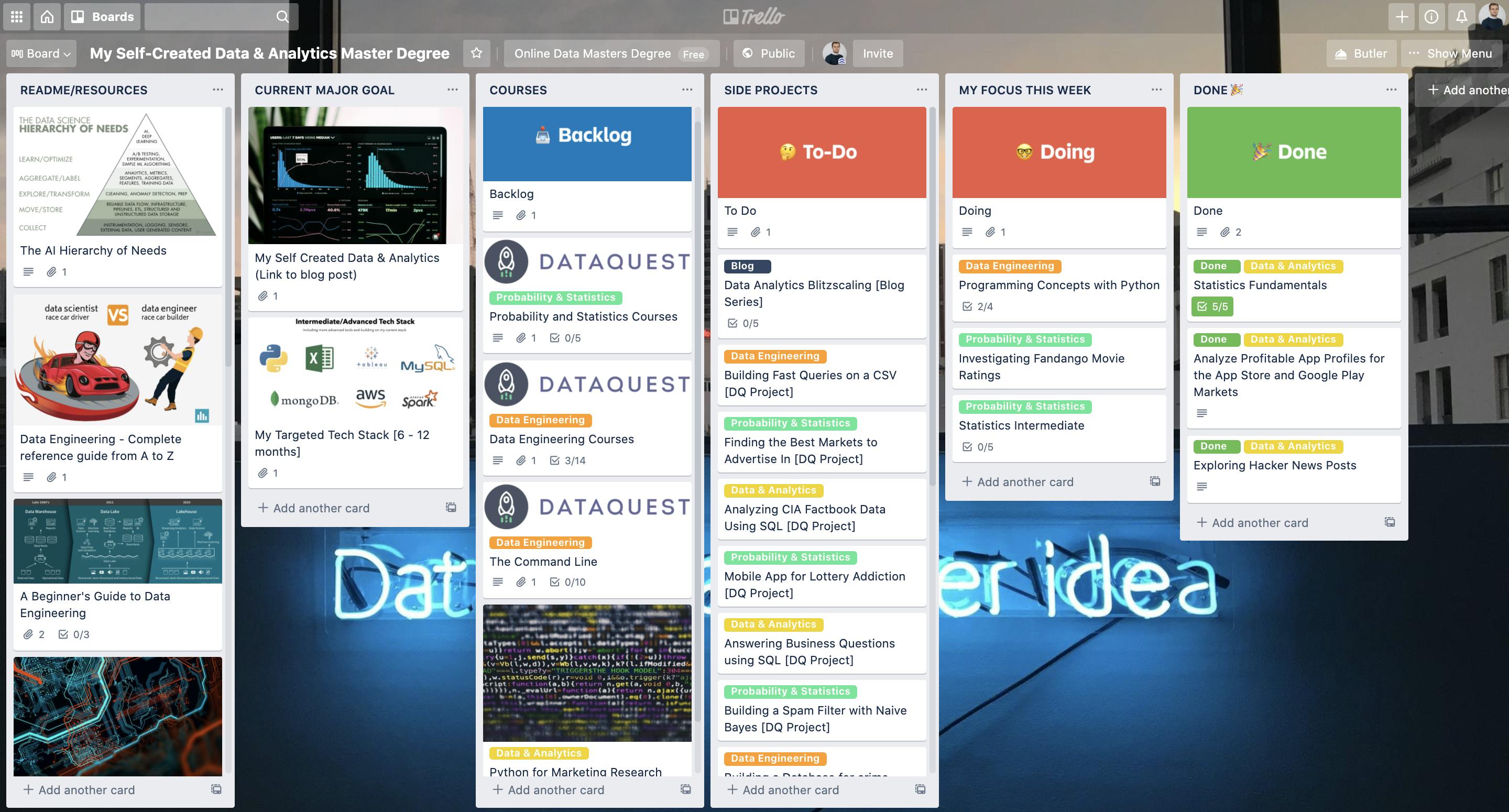
💎 Next steps
You can consider this article a work-in-progress of my self-created Data & Analytics Masters Degree curriculum. I’ll keep it updated as I go along with the courses I’m learning and the projects I’m working on.
If you have any advice for me, including courses I should look at or skills I should work on, please feel free to let me know in the comments, on Twitter or Linkedin .

